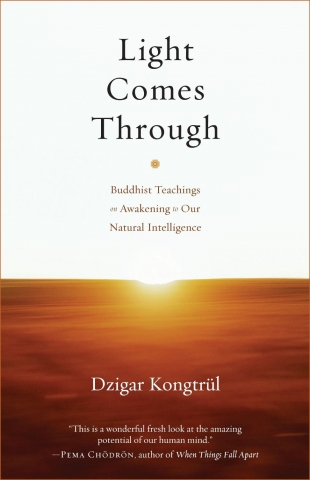Dzigar Kongrul grew up in a monastic environment and received extensive training in all aspects of Buddhist doctrine. In 1990, he began a five-year tenure as a professor of Buddhist philosophy at Naropa University. He also founded Mangala Shri Bhuti, his own teaching organization. Kongrul is Pema Chodron's teacher and friend. In this profoundly insightful work, he examines five self-centered emotions which plague all of us, takes a look at working with others, and assesses the Buddhist teachings on emptiness. He believes that meditation and contemplation enable us to get a better handle on happiness and suffering. He explains:
"Demystifying the relationship we have with our mind, our thoughts and emotions, is the essence of the Buddhist teachings. It is like switching on the light in a dark room; no matter how long a room has remained in a state of darkness, once we turn on the light, everything is illuminated."
The author introduces the Tibetan term shenpa which has been used in many talks by Pema Chodron. Although it is translated as attachment, it goes beyond that to encompass the self-centeredness that animates our wants, needs, aversions, and pride. Shenpa can be unmasked in meditation, and we can begin to see our habits, impulses, and emotions without judgment.
Kongrul begins with a thorough analysis of jealousy which he calls "the most obvious, ridiculous, and embarrassing of all the emotions." The mind that is in thrall to it wants what others have, whether a car, a prosperous career, or the best website. We feel that something is missing in our lives and a constant cloud of discontent hangs over our heads. We resent those who have and are willing to do almost anything it takes to bring them down. What is the antidote to jealousy?
"What we need now is a very strong antidote, and the antidote to jealousy is the practice of rejoicing. Rejoicing is simply feeling happy when something fortunate or beneficial happens to someone other than ourselves. . . . When someone becomes a vegetarian or donates money to a charitable organization, we can rejoice. We can rejoice in the virtue of people who have put their life on the line to help others, the Good Samaritan we hear about on the news. We can rejoice in the spiritual accomplishments of others."
Kongrul takes this discussion one step further by stating that rejoicing introduces us to "the wealth of the world." It enables us to connect with the goodness of others and the beauty all around us. It also releases positive qualities within us such as selflessness and good-heartedness.
This seasoned Tibetan teacher spins off keen assessments of aggression (including a practice to simmer it), attachment, arrogance, and stupidity. At one point, he alludes to a Kadampas teaching that goes: "Leave the human circle, and enter the circle of dogs. Then you will attain the divine state." He points out that to serve others and put them first involves humility. It means to stand outside the circle of pride and comparisons: "We can rest like an old dog with no need for confirmation and no fear of opposition."
